
Innate Immunity
Scope & Guideline
Connecting Science and Health through Immunology
Introduction
Aims and Scopes
- Innate Immune Cell Functionality:
Research on the roles and mechanisms of various innate immune cells, such as macrophages, neutrophils, and natural killer cells, including their activation, polarization, and interactions with pathogens. - Inflammatory Responses and Cytokine Signaling:
Studies investigating the signaling pathways involved in inflammatory responses, particularly the role of cytokines and chemokines in modulating immune responses. - Pathogen Recognition and Response Mechanisms:
Exploration of how the innate immune system recognizes pathogens through pattern recognition receptors (PRRs) and the subsequent immune response. - Innate Immunity in Disease Contexts:
Research linking innate immune responses to various diseases, including autoimmune disorders, infections, cancer, and metabolic diseases. - Therapeutic Interventions in Innate Immunity:
Studies focused on novel therapeutic strategies targeting innate immune pathways to enhance or modulate immune responses in disease. - Microbiome and Innate Immunity:
Research examining the interactions between the microbiome and the innate immune system, and how these relationships influence health and disease.
Trending and Emerging
- Innate Immunity and Chronic Inflammation:
An increasing number of studies focus on the role of innate immunity in chronic inflammatory conditions, underscoring the importance of understanding long-term immune responses and their implications in diseases such as arthritis and metabolic disorders. - Innate Immune Modulation for Therapeutic Purposes:
Research into therapeutic strategies that modulate innate immune responses, including the use of biologics and small molecules, is gaining traction as a promising area for developing new treatments. - Role of the Microbiome in Modulating Innate Immunity:
There is a growing interest in how the gut microbiome influences innate immune responses, with implications for autoimmune diseases, allergies, and overall health. - Cellular Mechanisms of Innate Immune Memory:
Emerging studies are investigating the concept of innate immune memory, exploring how prior exposures can shape future responses, a theme gaining prominence in vaccine development and infection control. - Impact of Metabolism on Innate Immune Function:
Research increasingly examines the relationship between metabolic processes and innate immune cell function, revealing how metabolic changes can influence immune responses in various diseases.
Declining or Waning
- Historical Perspectives on Innate Immunity:
While the journal has published several historical reviews, the trend indicates a decline in interest towards historical analyses of innate immunity, suggesting a shift towards more contemporary and applied research. - Non-specific Immune Responses:
There appears to be a reduction in studies focused solely on non-specific immune responses, as more research is moving towards understanding specific pathways and targeted immune interventions. - Innate Immunity in Non-Mammalian Models:
Research utilizing non-mammalian models to study innate immunity has decreased, possibly due to the growing emphasis on mammalian systems that are more directly applicable to human health.
Similar Journals
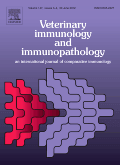
VETERINARY IMMUNOLOGY AND IMMUNOPATHOLOGY
Empowering veterinarians with cutting-edge immunological research.Veterinary Immunology and Immunopathology is a premier journal published by Elsevier, dedicated to advancing the field of veterinary science through rigorous investigations into the immunological mechanisms that underpin disease resistance, pathogenesis, and therapeutic interventions in animals. With an established history since 1979, this journal has consistently provided a platform for high-quality research, bridging the gap between immunology and veterinary medicine. The current impact factor reflects its significance within the field, particularly noted for its Q3 ranking in Immunology and Q2 in miscellaneous Veterinary categories as of 2023. The journal caters to a diverse audience, from seasoned researchers to students, by publishing original research, reviews, and case studies that explore pivotal topics such as vaccine development, immune response in various species, and the role of genetics in immunological disorders. Notably, it is indexed in Scopus, where it ranks in the top percentile of veterinary science disciplines, enhancing its visibility and impact within the scientific community. For those seeking to stay at the forefront of veterinary immunology, this journal is an invaluable resource.
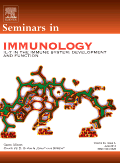
SEMINARS IN IMMUNOLOGY
Exploring the Depths of Immune ScienceSEMINARS IN IMMUNOLOGY, published by Academic Press Ltd - Elsevier Science Ltd, stands as a leading journal in the field of immunology and allergy, with an impressive impact factor that reflects its significant contribution to advancing research and discourse within these vital areas of medical science. Established in 1989, this esteemed journal has garnered a reputation for disseminating high-quality, peer-reviewed articles that span a broad spectrum of immunological topics, making it an essential resource for researchers, healthcare professionals, and students alike. Currently ranked Q1 in both Immunology and Allergy categories, SEMINARS IN IMMUNOLOGY ranks 39th among 233 journals in Immunology and Allergy and 43rd among 236 in Immunology and Microbiology according to Scopus, placing it in the 83rd and 81st percentiles respectively. This underscores its pivotal role in shaping the future of immunological research and clinical practices. While the journal operates under a subscription model with no open access option, it remains committed to providing comprehensive insights and fostering scholarly collaboration within the global immunology community.
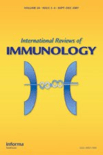
INTERNATIONAL REVIEWS OF IMMUNOLOGY
Catalyzing Collaboration in ImmunologyINTERNATIONAL REVIEWS OF IMMUNOLOGY, published by Taylor & Francis Inc, is a leading academic journal that has been a cornerstone of immunological research since its inception in 1986. With an impressive impact factor and ranked in the top quartiles of its field (Q2 in both Immunology and Allergy), this journal offers a critical platform for the dissemination of influential findings and advancements within immunology. Spanning a diverse array of topics, from basic immune mechanisms to clinical applications, it aims to support the global scientific community in enhancing immunological understanding and therapeutic interventions. Researchers and professionals alike benefit from insights provided by renowned contributors, ensuring that the journal remains relevant in a rapidly evolving field. Directly accessible through subscription or institutional access, INTERNATIONAL REVIEWS OF IMMUNOLOGY is committed to fostering collaboration and innovation, making it an essential resource for anyone involved in immunological research and practice.

Cellular & Molecular Immunology
Charting New Territories in Immunological ScienceCellular & Molecular Immunology is a prestigious peer-reviewed journal published by the CHIN SOCIETY IMMUNOLOGY. As a leading journal in the fields of immunology and infectious diseases, it proudly holds a Q1 designation across multiple categories, including Immunology, Allergy, and Medicine (Miscellaneous), reflecting its commitment to excellence and impactful research. With an ISSN of 1672-7681 and an E-ISSN of 2042-0226, the journal has been essential reading since its inception in 2004, continuously gathering insights from cutting-edge studies. It ranks impressively within Scopus, with positions in the 7th, 8th, and 9th percentile in relevant categories, establishing it as a cornerstone for researchers, clinicians, and students alike. The journal offers an extensive range of original research articles, reviews, and clinical studies, ensuring that readers stay at the forefront of immunological discovery. Whether you are interested in basic immunology, infectious diseases, or evolving therapies, Cellular & Molecular Immunology serves as an invaluable resource for advancing your knowledge and engagement in this dynamic field.
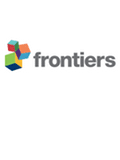
Frontiers in Immunology
Leading the Charge in Immunological Research and DiscoveryFrontiers in Immunology is a leading open-access journal published by FRONTIERS MEDIA SA since 2010, dedicated to advancing knowledge in the field of immunology. With an impressive Q1 ranking in both Immunology and Allergy as of 2023, this journal exemplifies excellence in research dissemination, positioning itself among the top 22% of relevant literature in the discipline. The journal, based in Switzerland, emphasizes its commitment to open science by ensuring all published research is freely accessible, fostering collaboration and innovation among researchers, professionals, and students alike. With substantial visibility demonstrated by its ranks within the Scopus database—ranked #52 out of 233 in Immunology and Allergy, and #58 out of 236 in Immunology and Microbiology—Frontiers in Immunology serves as a vital platform for cutting-edge research. Researchers are invited to contribute original investigations and reviews that expand the understanding of immune mechanisms, therapeutic advancements, and clinical applications, making it a cornerstone for those looking to push the boundaries of immunological science.
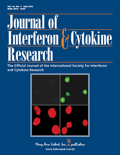
JOURNAL OF INTERFERON AND CYTOKINE RESEARCH
Connecting Research to Real-World Health SolutionsJOURNAL OF INTERFERON AND CYTOKINE RESEARCH, published by Mary Ann Liebert, Inc, stands out as a pivotal resource in the fields of immunology, virology, and cell biology, providing comprehensive insights into cytokine functions and their roles in immune responses. With ISSN 1079-9907 and E-ISSN 1557-7465, the journal aims to disseminate innovative research that advances our understanding of interferon and cytokine biology, a crucial aspect for developing therapeutic strategies against various diseases. Covering a broad scope of research from 1995 to 2024, it boasts a respectable impact factor within its category quartiles, ranking Q2 in Medicine (miscellaneous) and Q3 in the domains of Cell Biology, Immunology, and Virology as of 2023. While it does not provide open access options, the journal remains essential for academics, researchers, and professionals dedicated to exploring the complexities of immune signaling pathways and their implications for health and disease. The journal’s consistent contribution to scientific discourse underscores its importance in elevating query-driven studies to foster advancements in biomedical science.

IMMUNOBIOLOGY
Illuminating the path to breakthroughs in immunological science.IMMUNOBIOLOGY is a prestigious academic journal published by Elsevier GmbH that significantly contributes to the fields of hematology and immunology. With its ISSN 0171-2985 and E-ISSN 1878-3279, this journal has been disseminating impactful research since 1979, positioning itself at the forefront of immunological and hematological advances. The journal holds a commendable ranking of Q2 in Hematology and Q3 in both Immunology and Immunology and Allergy, indicating its relevance and influence within the scientific community, as reflected by its Scopus rankings. Although IMMUNOBIOLOGY operates under a subscription model, it remains dedicated to expanding knowledge across disciplines, fostering innovative research, and facilitating connections among researchers, professionals, and students. Situated in Munich, Germany, this journal is continually evolving and aims to remain an essential resource for the latest discoveries and insights in the realms of immunity and blood disorders, ultimately enhancing our understanding of complex biological systems.

Immunity Inflammation and Disease
Exploring innovative insights in immunology and allergy.Immunity, Inflammation and Disease is a premier open-access journal published by WILEY, dedicated to advancing the field of immunology and allergy. Launched in 2013, this journal has established itself as a significant platform for researchers and professionals to disseminate high-quality research findings and innovative insights that address critical issues in immune responses and inflammatory diseases. With an impact factor that reflects its growing influence and a current ranking in Q3 for Immunology and Q2 for Immunology and Allergy, this journal serves a diverse audience keen on exploring cutting-edge developments. Researchers are encouraged to submit their work to share their findings with a global reach, foster collaboration, and enhance the understanding of immune mechanisms and therapeutic strategies. Accessible since its inception, Immunity, Inflammation and Disease is committed to open science, ensuring that vital research is freely available for the advancement of knowledge within the academic community and beyond.
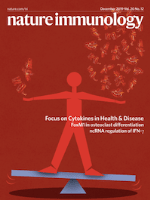
NATURE IMMUNOLOGY
Exploring the intricacies of the immune system for a healthier tomorrow.NATURE IMMUNOLOGY is a premier academic journal published by NATURE PORTFOLIO, dedicated to advancing the field of immunology. With an impressive impact factor that reflects its esteemed position, this journal ranks in the top quartile (Q1) of renowned categories, including Immunology and Allergy. Serving as a crucial platform for researchers, professionals, and students, NATURE IMMUNOLOGY showcases cutting-edge research, comprehensive reviews, and insightful perspectives that drive innovation in immunological science. Based in the United Kingdom, this journal has been a vital contributor to the global discourse on immune responses and related diseases since its inception in 2000. Researchers can benefit from its rigorous peer-review process, ensuring that only high-quality studies are disseminated, thus enhancing their academic pursuits and practical applications. Explore the latest findings and trends within this flourishing discipline, making NATURE IMMUNOLOGY an essential resource for anyone engaged in the study of the immune system.

Mucosal Immunology
Unveiling the Secrets of Mucosal DefenseMucosal Immunology, published by Elsevier Science Inc, is a leading journal dedicated to advancing the field of immunology with a particular focus on mucosal immunity. Since its inception in 2008, the journal has established itself as a premier source of cutting-edge research, evidenced by its impressive Q1 ranking in both Immunology and Allergy for 2023, and its notable positions within the top ranks of Scopus (Rank #21/233 in Immunology and Allergy and Rank #24/236 in Immunology and Microbiology). The journal serves as a vital resource for researchers, professionals, and students aiming to explore the complexities of mucosal immune responses and their implications in health and disease. While it operates under a subscription model, Mucosal Immunology is committed to disseminating quality research globally and enhancing collaborative efforts within the scientific community. Explore the latest findings and connect with influential scholarship in this rapidly evolving field.